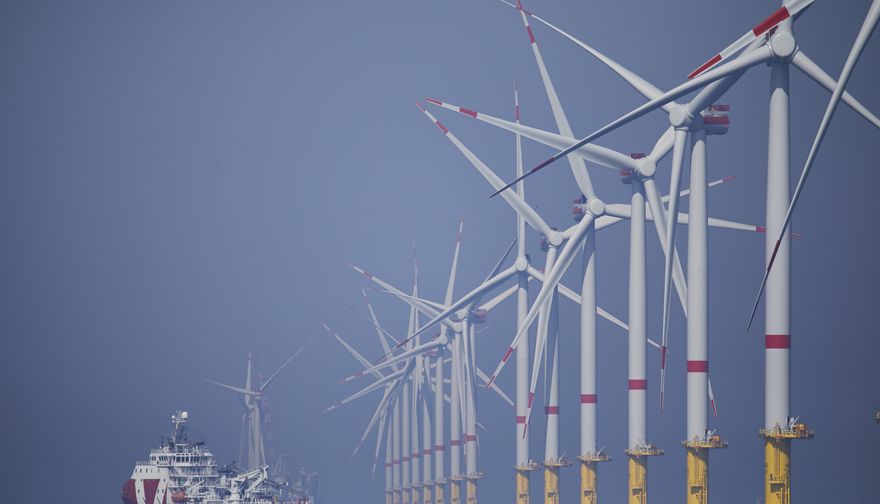Britain’s hugely successful flagship policy supporting clean electricity is to be reformed, as ministers ponder extending its rewards to developers for the sector’s non-financial benefits.
Energy ministry D-ESNZ called for evidence this morning, intended to shape a probable consultation towards widening the remit of the eight year-old Contracts for Difference regime.
As a market intervention promoting low carbon generation, CfDs are acknowledged as an unquestioned success. Securing billions in new investment, they have pushed radically lower the long-term support prices which developers need to erect turbines or build out PV farms.
Now ministers want to find a way to recognise clean power’s harder-to-quantify benefits, such as plugging UK skills gaps, ensuring national energy security and strengthening the supply chains necessary to secure low-carbon equipment & finance.
Since their introduction in 2015, CfDs’ have been judged solely on the bid prices submitted by clean plants such as wind and solar farms.
Emerging from a succession of blind auctions, contract awards guarantee qualifying projects’ financing for 15 years, through the inclusion of compensating ‘floor & ceiling’ margins around a central strike price. The margins are linked to fluctuations in daily traded values for wholesale power.
Offshore wind has seen the most dramatic falls in guarantees sought. Prices bid per MWh in the now annual CfD auctions tumbled by 70% between 2015 and 2022, according to government figures.
Allocated to projects last July, the CfD regime’s fourth bidding round secured nearly 11GW of clean new capacity. Last month, renewables investors criticised as “too low” ministers’ commitment of £205 million to the scheme’s fifth allocation round (AR5), due to be divided up later this year.
With CfDs now underpinning 26.1GWp of UK capacity in wind, solar & biomass, the government announced this morning it now seeks early evidence from stakeholders, foreshowing a probable full consultation on re-thinking CfDs.
Ministers know they need to boost clean generation radically, in quest of targets such as its 2021 pledge to decarbonise electricity totally by 2035.
Responding at that time, independent analysts Cornwall Insight calculated the goal requires offshore wind capacity to more than quadruple, from around 10GW now to 44GW by 2035. Onshore turbines would need to increase too by at least 14GW, to between 30GW and 44GW. A doubling of solar’s current 15GW would also be required.
Observers have argued that the wider economic benefits already delivered by Britain’s surge in renewables deployment have not been recognised. Earlier this year in his government-commissioned review of energy policy, backbench MP Chris Skidmore argued that ‘softer’ factors, such as clean generation’s enhancement of UK energy security, should be acknowledged and compensated.
Tim Pick, recently the government’s recent advocate in Whitehall for offshore wind, echoed Skidmore’s pleas for reform earlier this month.
Announcing today’s call for evidence, D-ESNZ minister of state Graham Stuart said: “Our flagship Contracts for Difference scheme has been hugely successful.
“Now we want to go further to ensure we maximise the scheme’s potential to improve energy security and ensure developers can make the necessary investment in supply chains and innovation, which will ultimately make for a stronger sector and help our economy to grow”.
“This potential reform to the scheme.. presents a solution to grow the renewable energy supply chain as we accelerate our energy transition plans to power more of Britain from Britain.”
The proposed reforms dovetail into Whitehall’s attempts to adjust the CfD scheme in line with
Recent offshore wind champion Tim Pick welcomed the ministry’s move. “As noted in my recent report, price-only CfD auctions have created a strong driver for innovation, “ he said.
“But there is a need in the current climate to consider how to better develop new supply chains and associated jobs.
“The current global context arguably provides the justification for considering a more nuanced approach as part of a wider package of measures, especially as we seek to seize a first-mover advantage in the deployment of floating offshore wind technology at scale.”
For power generators represented by Energy UK, deputy director Adam Berman said: “The Contracts for Difference (CfD) programme has played a key role in ensuring the UK’s position as a global leader in low carbon technologies.
But factors such as inflation, commodity price increases, and pressure from international competition mean that the UK will have to continue working hard to pull in the investment required to reach our Net Zero and energy security goals”.




